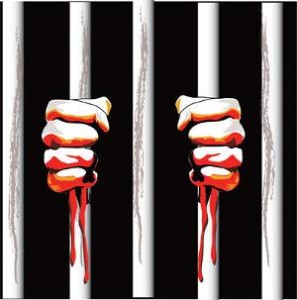The issue of election voting for criminals has been settled by the Election Commission of India. Prisoners, those convicted and those under trials, in India, can’t vote in the elections. However one needs to understand the details of the same. Find out about it in detail over here.
The Laws Of Election Voting:
According to Section 62 (5) of the Representation of the People Act, 1952, “No person shall vote at any election if he is confined in a prison, whether under a sentence of imprisonment or transportation or otherwise, or is in the lawful custody of police.” The sub-section further provides that nothing in the section will apply to the persons subjected to preventive detention under any law. More information regarding the election voting can be found on this link.
The chapter 43 of the General Elections 2014 Reference Handbook makes the issue of election voting for criminals clear by mentioning, “Under trial prisoners and persons confined in prison otherwise are not eligible to vote, even if their names are registered in the electoral votes. However, persons under preventive detention are eligible to vote by post as per Section 62 (5).”

Convicted criminals and prisoners are banned from election voting participation. Also, those with an unstable mental condition are stopped from election voting. But there is still some confusion among the prison officials regarding election voting rights of prisoners. Officials agree that the convicted can’t vote but as far as those under trials are concerned, it is being said that they can exercise their voting franchise if they want to. Prison officials maintain that there has never been an instance of those under trials casting votes in any election till date.
Special Conditions when criminals can participate in Election Voting:
There is an exception though. Those who have been detained under the Goondas Act, the National Security Act (NSA) and the Conservation of Foreign Exchange and Prevention of Smuggling Activities Act (Cofeposa) can cast the votes from inside the prison itself. A ballot paper is sent to the detainee in prison and he/she can cast the vote. The ballot paper is then sent back to the returning officers by the Department of prisons.
That those persons under trials can’t cast the votes has been made clear in the latest General Elections 2014 Reference Handbook but there seems to be confusion about it in the prison department. An official of the department said that if the person under trial want to cast the votes, the prison office will help in the procedure. The prisoner will have to ask family to get his/her voter ID card for election voting.
Based on the voter ID card, the prison officials will then inform the district election officers or the returning officers, who will send the ballot papers and the persons under trials will be able to cast the votes on the day of polling. A senior official mentioned that nobody has even taken the interest to cast their vote till date.
Efforts for prisoners’ rights:
Efforts are ongoing from many states that fight for greater humanitarian rights for the prisoners. According to those making the efforts, the prisoners are citizens of India too and so are part of the Republic, deserving equal participation in elections. The cause for election voting rights for prisoners and the convicted has not found widespread support yet.
Having said all that, as far as India is concerned, this is not a very big issue.
As per the statistics gathered by International Centre for Prison Studies there are 372,296 people in prisons in India as of December 2011. This includes under-trials on whom the court proceedings are on and the sentence, if any is pending. In context to the above number, the overall electorate in India is at 714 million people as on 2009, and hence this number is not significant enough to be under discussion.
While denying election voting rights to those under trials goes against the principle that one is innocent until proved guilty, not allowing convicts to vote will increase their side-lining from society.
The Supreme Court’s decision in 2013:
Justices A.K Patnaik and S.J. Mukhopadhaya ruled that since one of the conditions given to be a candidate under The Representation of the People Act, 1951 was that the candidate should be eligible to vote, and even those in lawful custody of the police could not contest elections. They reached the above conclusion because it is established law in India that the individuals in lawful custody of the police, those under trials and the persons serving a prison sentence after conviction; cannot vote.


Comment Policy [Please read this before posting your comments]: Only use your real name. Your words are your own, so be nice and helpful if you can. Please, do not share any personal information in your comments. For further details, please read our Comments Policy available over here.